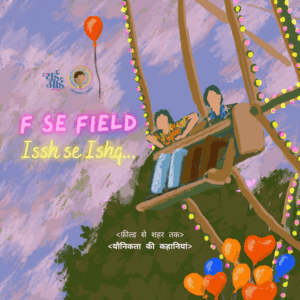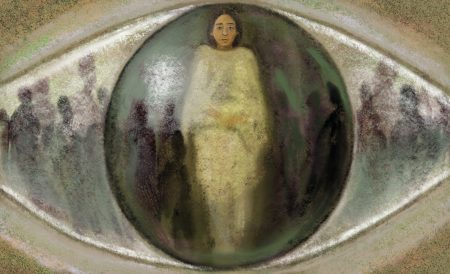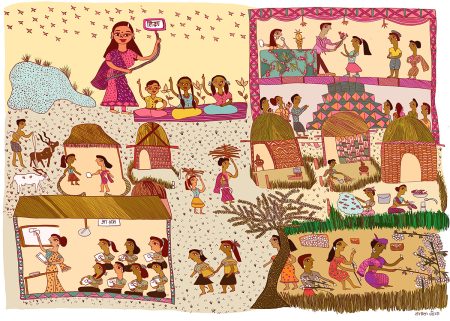Translated from the Hindi by Ruchika Negi
Dear…….,
About 15 km north of Toranmal, on the border of Maharashtra and Madhya Pradesh, lies Sindhidigar village. You have to cross several rivers – big and small – to reach it. Jhalkar is a small river that flows between the borders. In fact the villagers believe that the river divides the land into two separate states and the river is why these states exist.
The bad roads make it very difficult to get to Sindhidigar on a motorbike. I have had a fall once or twice while trying to reach it, but thankfully wasn’t badly hurt.
The population of the village as per the panchayat is about 1,800 or so. Actually, the village doesn’t have an independent panchayat of its own. All the panchayat work is done in Toranmal itself. The villagers say that all the early settlers here came from Madhya Pradesh. They came to find work. They came to cut trees in the forest. It would take them three or four days to walk back to their villages. So that’s how, over time, they began to stay back, live here, and gradually became a part of this land. Slowly, they started to do farming as well, and thus began this settlement of Sindhidigar.
By now you must be wondering why I am going on and on about this village and what you are supposed you do with all this information. The thing is that once we had tried to nurture an imagination of a different kind of country.
What if a country has two parts? Which is not to say that the country would be divided in two, no… just a nation with two parts, two aspects? I am sure you remember this too.

I’ve observed here that only the men exude absolute power, authority and respect. The country, the village, the city, the home – it is all owned by men.
And what is truly disheartening is that nothing seems to belong the women – not the village, neither the city, nor the home. The women don’t have the slightest presence in any sphere of life here.
The first day when I went to Sindhidigar, I went to the anganwadi as I had to meet the anganwadi worker. She wasn’t there. Closeby are a few houses. I called out from the outside of one, “Is there anyone at home?” A middle-aged woman, her face veiled in a ghunghat, came to the door. I asked, “Where is the anganwadi worker’s home? I have to meet her.”
The woman did not utter a word. She just stood still. I thought perhaps my Hindi was difficult for her to understand. So I asked her the same question in Marathi. Still not a word. She simply went back inside the house. I thought, maybe she will get someone else from inside, so I waited. No one appeared. After a while, I left.
I walked on and spotted another woman who was drying tobacco leaves in her courtyard. Four or five children were playing around her. I went up to her and asked, “I want to meet the tai who works at the anganwadi; could you please tell me where she lives?” She pulled at her ghunghat a little, spat out the juice from the tobacco wad she was chewing, picked up a child and went inside her house. A man stepped out.
He had a gamcha tied around his head. I repeated my question. He said, “Walk on a while and you will come to Karbhari basti. Ask the headman there, he will definitely know.” I thanked him and started walking towards Karbhari basti.
I was wondering all the while why the two women did not speak to me. You also please think about it.

“Yes, everyone has them. But mostly women don’t have Aadhar cards or bank accounts.” I asked, “Why?” He thought for a while and said, “They don’t need all that, that’s why. As it is, they don’t step out much.”
Just then, the headman’s wife came to the threshold of the house to give us tea. He took the tea from her and handed it to me. I left after a while and returned to my room the same day in Toranmal. That night I kept seeing women in veiled faces, standing at the thresholds of their homes. The ‘silent’ woman who stood transfixed at her doorstep; the ‘deaf’ woman, her face veiled, drying tobacco in her courtyard; the ‘confined’ woman, trapped within her home despite being the headman’s wife – all these faces kept floating in front of me.
The next day I met the Patil, equivalent of the figure of the police in that village. It’s a hereditary position too. Only men become Patils. The day before, I had asked the headman for directions to the Patil’s house and went to meet him in ‘Patil’ basti.
I parked my motorbike near the nala and the house was right across it. A boy of about 17 years was standing in front of the house along with three women. One seemed young, just a girl, perhaps 16. The other two were middle-aged. I asked the boy, “Is Patilji at home? He said, “Yes, he is. He’s in the fields planting wheat.” The boy turned to one of the middle-aged women, “Go call him.” A 12-year-old boy was also hanging around along with this boy. I asked the older fellow, “How are you related to this boy?” He said, “He’s my brother. I am the Patil’s son.” Meanwhile, one of the women asked him to look after a baby and went inside the house. I asked him, “Whose child is this?” He said, “This is my daughter.”
By then the Patil arrived. I chatted with him for a while, after which he walked me to my bike. I saw lots of women on the way, fetching water. They have to carry this water from faraway places, a very arduous and tedious task. You have to simultaneously manage the veil on your face, balance the steel pots on your head, and trudge up and down the slopes for miles on end.

On my way back, I stopped at Sandeep’s place. I had mentioned him in my first letter, you may remember. With a Bachelor’s degree, he is the most educated man in the village. He invited me in, and offered me tea. After a while, I raised with him all that had been bothering me over the last couple of days.
I asked him, “Are you the only educated one in the village? Aren’t there any women who are educated like you?” In reply, he said, “Sir, in our Pawra community, girls are married off at a young age. That’s the reason why girls and boys don’t study much here. If they are not married off early, they run away with the person of their choice anyway. No one wants to invite that kind of trouble here.”
I said, “What’s the problem if that happens? If a boy and a girl really love each other with all their heart, what’s wrong with it?”
He said, “The problem is that marriage should not happen in the Biryani community, sir.”
“Biryani?! What is that?,” I asked.
Sandeep explained that Biryani meant that one gets married to someone who is outside one’s own community. Whoever does this gets associated with the Biryani community and is shunned in the village. His family also faces discrimination and are served food separately.
They lose their social status and respect. Whether it is a boy or a girl, this norm applies equally to both the sexes.
Do marriages mostly happen in Madhya Pradesh or Maharashtra, I asked.
Sandeep said, “Girls from Madhya Pradesh are brought here after marriage, and we also give dowry. To the girl’s father. Everyone gives depending on how much they can afford – Rs. 30,000 – Rs. 40,000…like that. Some fathers use this money to make jewellery for their daughters, while others to meet various wedding costs. And then there are some weird ones also who blow up all this money on booze.”
I asked, “Tell me, why do all the women cover their faces?”
“Sir, in our community a woman must cover her face in front of an older man, or an outsider. So if I am the older one at home, my brother’s wife will wear her ghunghat in front of me. And this is how it should be as well, because it’s the matter of regard and respect, isn’t it, sir?”
I did not know how to reply.
There was a big dhol in Sandeep’s house. He said, “My father beats this dhol during Holi. He is much respected for that.”
“Do women also go for Holi?”
“Yes, they do. But women whose parents are no more are not supposed to participate in the Holi puja.”
As I came out of Sandeep’s house, I saw his mother smearing the walls of the house with a mud paste. I then remembered my own mother. She also decorates the walls of our home like this during Diwali.
Wherever you see, there are only men. That’s why I had said that this is a men’s village. The men have been following the same age-old traditions and habits that have been passed on forever. No one in the village has TV, electricity, access to a mobile network; and neither do they earn much from farming. That’s why they don’t harbour too many hopes as well.
When I go to Sindhidigar, I see women either standing around carrying children or fetching wood from the forests to light their chulhas. You can see some with pots of water on their hips or balanced on their heads. My eyes cannot spot a single woman managing a shop or at a public meeting. To spot one at the forest office, with the land documents in hand, is out of the question. She will neither become any sort of manager or Patil ever. She has only one place if you need to find her, the anganwadi. And I will tell you one more thing – I have seldom… almost never –heard a woman’s voice here.
Awaiting your reply,
Prakash
Read first letter here.
Ruchika Negi is Associate Editor at The Third Eye.





